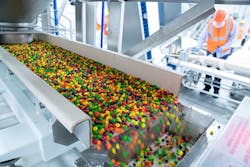The latest news of digital transformation includes a partnership between food and petcare company Mars, Inc., and Microsoft Corp, as the two build upon a longstanding technology relationship that now will impact every touchpoint across the consumer experience, the companies said.
The partnership, announced in May, marks a significant move forward for Mars, which up until now was testing out innovation in corners of the company, such as a farm-to-fork tracking application that utilizes technology from Transparency-One, running on the Microsoft Azure platform, to help monitor rice production for its Ben’s Original brand, thereby giving customers insights into where and how rice was grown. The newest agreement expands the reach of intelligent manufacturing supply chains.
The companies are working to integrate data across a digital infrastructure that will provide Mars with business insights to accelerate growth and develop trust with customers and consumers through transparent experiences, the company said. The use of artificial intelligence (AI), digital twins, and Internet of Things (IoT) technology across Mars’ global portfolio of confectionery, petcare, pet services, and food businesses positions the company for more intelligent manufacturing and personalized customer engagement. Mars is also focusing on ways to improve digital skills training for its global workforce.
Working with Accenture as a partner to Microsoft, the companies are further expanding a unified cloud and data foundation across all Mars businesses on Microsoft Azure, helping Mars achieve its “cloud-first” strategy.
“It will change the relationship between our brands and consumers, deliver hyper-relevant consumer experiences that include content and media, and fulfill needs and expectations across every touchpoint in the consumer’s journey,” said Sandeep Dadlani, chief digital officer for Mars in a statement about the partnership. “After evaluating all the platforms on the market, we chose Microsoft as our primary Mars platform because of its rich portfolio of features, engineering partner ecosystem, talent availability, focus on data privacy, and security and similar cultural values and principles.”
Mars has already made progress to enable this digitization, working with digital manufacturing and operations experts from Accenture’s Industry X group to deploy the Azure Digital Twins IoT platform in its manufacturing facilities in order to optimize production, improve margins and reduce waste, and empower on-site associates to make real-time decisions. Based on this use case, Mars will be able to quickly scale to use similar IoT technologies for optimizing manufacturing across its business segments, providing process control, consistency and uniformity across product lines, increasing speed and capacity, and reducing operational costs.
In the future, Mars plans to use digital technologies to introduce even more intelligence into the end-to-end supply-chain processes, including identifying the optimal way to create products through digital simulations that take into account climate and other situational considerations, as well as creating greater transparency and visibility into its supply chain from the point of origin all the way to the consumer.
Next steps
Mars plans to continue incorporating digital technologies to evolve and transform its workplaces, focusing on increasing the digital skills of its workforce. To accomplish this, Mars, Accenture and Microsoft will work together to establish an Innovation Lab to collaborate on the use of advanced technologies, expedite time to market for new use cases, direct-to-consumer initiatives, sustainability efforts, and digitized product innovation. Through the Innovation Lab, Mars is empowering its workforce with tools such as Microsoft Teams and Microsoft Viva, to drive tighter integration between its businesses and increase productivity and collaboration for its associates.
“By driving greater efficiency and effectiveness, we’re giving our associates the gift of time to focus on what they do best. And we’ll do so faster than ever — reducing time to market to weeks, rather than months or even years,” said Dadlani in a blog post. “We’ll also accelerate intelligent supply chain efforts, including scaling digital manufacturing and expanding the use of AI and data solutions to create smarter factories. This includes everything from a 1% savings on confectionery products to improved quality control. Finally, the relationship emphasizes sustainable growth by reducing our carbon impact in the transition to a cloud-first strategy. We’ll also work to reduce waste during the manufacturing process by driving technological efficiencies.”
Mars, Accenture, and Microsoft share similar ambitions around sustainability, which was a key decision-making factor for Mars choosing Azure, Dadlani said. As Mars continues to migrate key infrastructure and workloads to Azure, Microsoft’s commitment to 100% renewable energy in its datacenters by 2025 will help Mars reach its own goal to reduce its total greenhouse gas emissions across its value chain by 67% by 2050. The relationship is also helping Mars make progress toward its other sustainability goals around environmental impact by implementing technology solutions for reducing the waste of energy, raw materials, and water across its production facilities around the world.
Leaders relevant to this article:

